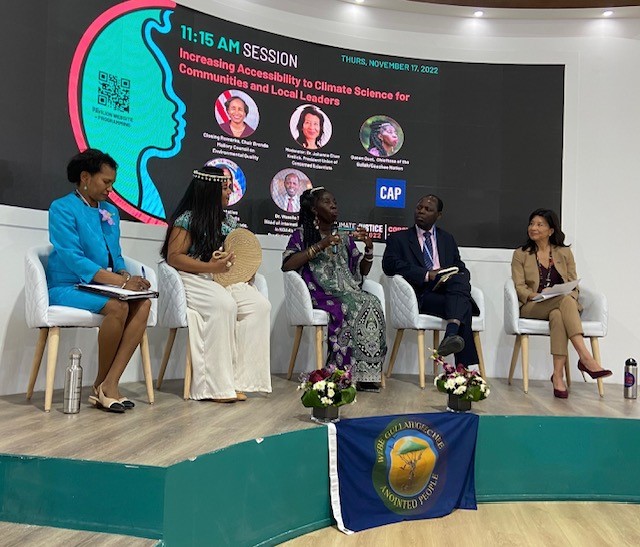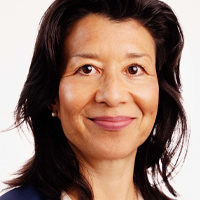For nearly three decades, the United Nations—the world’s preeminent multi-lateral institution working to advance peace, dignity, and equality for a healthy planet—has been bringing together almost every country around the globe for an annual climate summit. This twenty-seventh ‘Conference of the Parties’ (COP) was hosted by Egypt from November 6-18 this year.
Last month, I returned from COP27 in Sharm El-Sheikh, where I and a small but mighty group of UCS scientists and advocates sought actions that would dramatically curb and cease fossil fuel emissions, and put science-informed solutions into the hands of communities dealing with already severe climate impacts. For two weeks, we were at the center of insider meetings and open discussions on topics that included loss and damage, polluter accountability, and more. Full coverage of our work can be found here.
Since COP27, much global media has focused on whether the summit was a success or not. This simplistic framing is frustrating because it obscures the complex power dynamics that have shaped COP outcomes for the last 30 years. More disappointing, framing outcomes in false binaries of success or failure can lead us to think that the most consequential climate actions only take place at these elite global summits—when action is urgently needed from every single one of us, and, from every institution, corporation, and government.
I left COP27 fortified in the certainty that it’s up to each of us to make the future we want to see. Science and experience tell us definitively that humanity retains an enormous amount of control over just how hot it will get on our precious planet. What we know for sure is that the world of the future will reflect the decisions we each make today.
So, what’s next?
Wherever you live and whatever you do, you can strengthen your climate impact by deepening your knowledge about the many inspiring success stories and lessons from around the world that aren’t necessarily apparent in conventional media. Anchoring ourselves in a fuller understanding of the web of global politics, special interests, and principled voices that have been shaping the climate movement for over 30 years is a great step, and I recommend this short video to deliver those goods.
In the video, veteran Malaysian climate advocate Chee Yoke Ling unpacks the ambition, politics, setbacks, and victories of COPs from the last thirty years. A key point that Yoke Ling makes—and frankly, my biggest takeaway from attending the latest COP in Sharm El-Sheikh, is:
If we really want to have serious climate actions, they must be based on good science and equity.
Science and equity are exactly what UCS is powerfully positioned to contribute to the US and global climate movement. Certainly, the most energizing connections and conversations I had in Egypt sit at the center of these two vital perspectives.
So, in an effort to transcend simplistic media headlines and bring you behind the COP curtain, here are two inspiring examples of progress from COP27 that powerfully combine science and justice, and put us on a fast-track to the world we want to leave to the next generations.
[Science + community knowledge] x policy + law = climate wins
As I described in my first COP27 post, UCS was a co-sponsor of the first-ever Climate Justice Pavilion at any COP in the last 30 years. This dedicated space provided a platform for examples of how equity and justice can dramatically increase the speed, scope, and scale of climate action. Certainly, this type of courageous work has been happening in the US and around the world for decades but it’s more important than ever to have a dedicated space for building community among environmental justice-focused groups, and to raise awareness among COP participants.
Especially meaningful for me was the chance to contribute to the conversation about how local knowledge can supplement science to create change, as the organizer and host of a panel titled “Community Knowledge, Science, and the Law: Policy & Accountability Approaches Advancing Climate Justice.”
Global human rights and environmental law practitioner César Rodríguez Garavito and visionary lawyer, organizer, and leader Colette Pichon Battle shared examples from Louisiana to the Amazon of how engaging the generations of insight and knowledge in local people’s lived experiences can make climate solutions so much stronger and more sustainable when combined with data, evidence, and law.
Community knowledge includes Indigenous Traditional Ecological Knowledge, born of a historical symbiotic relationship—hundreds and even thousands of years old—between people and landscapes. It includes folks living in Flint, Michigan, who knew there was something wrong with their water even when city administrators assured them it was safe to drink. It reflects your own observation that winters in your hometown are warmer today than they were when you were a child. Nothing about Indigenous knowledge conflicts with science (another means of organizing and accumulating knowledge) and both are at the heart and soul of informing how we approach climate solutions at UCS.
Colette and César shared US and global examples of how combining both forms of knowledge dramatically strengthens lasting and truly public-serving climate outcomes in our halls of government and in our courtrooms. It was an enlightening conversation, one I was glad to facilitate out in the open at COP27. I was also pleased to hear from audience members who appreciated the timeliness and relevance of this important topic.
Building better resilience using scientific data
I was also gratified to see climate resilience getting a lot of attention at Sharm el-Sheikh. By “resilience,” I don’t mean the harmful romanticized notion that has been used to characterize some communities’ experience as they endure repeated climate and environmental disasters without the help or resources than they require.
My colleague Juan Declet-Barreto explains that this frequent glorification narrative is “a convenient framing that lets governments off the hook” for their accountability to vulnerable populations on “risks to which scientists have provided plenty of warning and solutions.”
Authentic resilience is rather intentional, evidence-based efforts that put agency and power in the hands of communities themselves to effectively respond to climate catastrophe, and supplement these with adequate resources.
I was excited to delve into examples of authentic resilience as the topic of another panel discussion I moderated with participants who are actively living the concept of resilience: Representative Sheila J. Babauta of the Northern Mariana Islands; Queen Quet Marquetta L. Goodwine, Chieftess of the Gullah/Geechee Nation; and Dr. Wassila Thiaw, the head of International Desks in the National Oceanic and Atmospheric Administration’s Climate Prediction Center, along with Brenda Mallory, the chair of the White House’s Council on Environmental Quality.

The underlying context for our discussion is that communities, especially Black, Brown, Indigenous and low-income communities in the US and around the globe, lack not only access to climate data but also the resources to develop it locally and develop and implement climate adaptation plans. Decades and sometimes centuries of disinvestment, racist policies, and exploitative business practices have left racially marginalized communities not only more vulnerable to climate change, but without the necessary means to become more climate-resilient.
Our panelists are in the thick of these issues. Our practical discussion highlighted new climate data tools recently released by the U.S. government, and explored what gaps remain in existing climate communications, technical assistance, and capacity building. A major theme was how up-to-date, local climate data is a vital asset that needs to be sourced and shared broadly as part of true resilience solutions. Panelists also highlighted changes in practice and policies that could help communities access necessary resources and funding.
Environmental justice communities are hungry for climate and environmental data and they want the agency to generate it themselves. They also hold knowledge and data in the lived experiences that are critical to identifying both local vulnerabilities and solutions that work. I was thrilled to also be able to point into the audience to Beto Lugo-Martinez during our discussion. Beto founded Kansas’ City’s Clean Air Now, a leader in community-engaged science. In Kansas City, Clear Air Now helps local neighborhoods use air-quality monitors to collect data that is shaping policy and governments responsiveness—a real time and robust example of building resilience from the ground up.
I’m proud that UCS is already a leader in helping communities access scientific and socioeconomic data—and we know we can do more. For example, data from our Underwater report is giving communities information about how severely sea level rise will affect local homes and businesses under different emission scenarios. We also provide local data on how deadly heat days will increase across the United States and by when. With this data in hand, communities are assessing, for example, whether to expand cooling centers, or where to invest in planting trees. You can find our panel discussion on data and its role in climate resilience here, on YouTube.
Real talk leads to real change
The two examples above are just a sample of dozens showcased at COP27. To me these panels were inspiring for the spirit of ‘real talk’ that characterized discussions hosted at the Climate Justice Pavilion—and also for how this programming lifted up success stories and proven solutions that have traction across the world. By fusing local knowledge and lived experiences with science, we can achieve greater speed, scope, and scale on responsible, sustainable, and equitable climate solutions.

